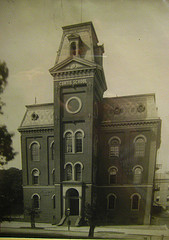
William Curtis School (Adolf Cluss, 1875), O Street, NW between 32 and 33rd Streets. Razed 1951. DCPS Archives
Those of you out there who went to graduate school, try to think back to the early days….I know the PTSD makes it difficult, but try to remember the beginning of graduate school. Do you remember the required classes that you had to take? These classes were a mostly a hodge podge of random professors talking about either their own work, or a concept they may not even be familiar with. I read a Commentary in the journal Cell the other day that gives me hope that schools will consider modifying their graduate curriculum and spend more time on teaching.
The Commentary focuses on changes that are being made to the graduate curriculum at Harvard in their umbrella biological science program. One change they are making is offering short format skill building courses. These short courses can cover a technical skill, experimental design, presentation skills or quantitative methods. This is a great way to offer focused instruction on a particular concept and deliver it to those who are interested. While they are offering the new short form classes, they are also revising their long format core courses. The diverse departments are now focusing more on key concepts and skills and sacrificing the mechanistic details. They are even bringing “clickers” (a handheld device a student uses to answer professor’s questions anonymously in real-time) to graduate school, as many newly entering students have been using these all throughout undergrad (I am old, and have never used a clicker other than to change the channels on my grandma’s TV).
I’m particularly excited about a program they are enacting for post-docs called the Curriculum Fellows Program. These fellows interface with the instructors and graduate students helping to manage courses, develop curriculum, implement teaching technology, and evaluate new techniques. This would be a great opportunity for a post-doc interested in teaching and education research. While many PhDs get some teaching experience, this would be a way to really look at the science of learning and make a contribution in improving the program. I’m happy to see that schools are taking note that the times are changing and just slapping together some classes isn’t going to cut it any more.